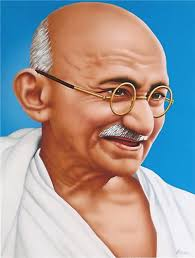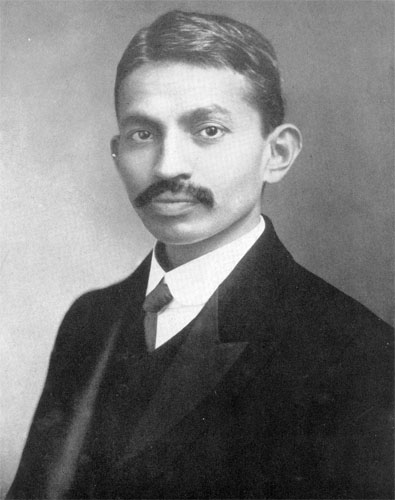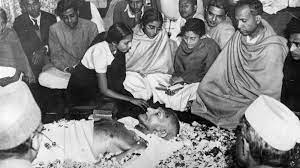Mahatma Gandhi Biography
|
Full Name: Mohandas
Karamchand Gandhi |
Early Life and Family Background
He was born on 2
October, 1869 in Porbandar, Gujarat. His father’s name was Karamchand Gandhi
and his mother’s name was Putlibai. At the age of 13, Mahatma Gandhi was
married to Kasturba which is an arranged marriage. They had four sons namely
Harilal, Manilal, Ramdas and Devdas. She supported all the endeavors of her
husband until her death in 1944.
His father was
Dewan or Chief Minister of Porbandar, the capital of a small principality in
Western British India (Now Gujarat State). Mahatma Gandhi was the son of his
father's fourth wife Putlibai, who belonged to an affluent Vaishnava family.
Let us tell you that in his earlier days, he was deeply influenced by the
stories of Shravana and Harishchandra as they reflected the importance of
truth.
Education
When Gandhi was 9 years old he went to a
local school at Rajkot and studied the basics of arithmetic, history,
geography, and languages. At the age of 11, he went to a high school in Rajkot.
Because of his wedding, at least about one year, his studies were disturbed and
later he joined and completed his schooling. He joined Samaldas college in
Bhavnagar in 1888 at Gujarat. Later, one of his family friends Mavji Dave Joshi
pursued further studies i.e. law in London. Gandhiji was not satisfied with his
studies at Samaldas College and so he became excited by the London proposal and
managed to convince his mother and wife that he will not touch non-veg, wine,
or women.
"First they ignore you, then they laugh at you, then they fight with you, then you win."
- Mahatma Gandhi
Off to London
In the year 1888, Mahatma Gandhi left
for London to study law. Thereafter 10 days of arrival, he joined the Inner
Temple, one of the four London law colleges, and studied and practiced law. In
London, he also joined a Vegetarian Society and was introduced to Bhagavad Gita
by some of his vegetarian friends. Later, Bhagavad Gita set an impression and
influenced his life.
At South Africa
In May, 1893 he went to South Africa to work as a lawyer. There he
had the first-hand experience of racial discrimination when he was thrown out
of the first-class apartment of the train despite holding the first-class
ticket because it was reserved for white people only and no Indian or black was
allowed to travel in the first class. This incident had a serious effect on him
and he decided to protest against racial discrimination. He further observed
that this type of incident was quite common against his fellow Indians who were
derogatorily referred to as coolies.
On 22 May, 1894 Gandhi established the Natal Indian Congress (NIC) and worked hard to improve the rights of Indians in
South Africa. In a short period, Gandhi became a leader of the Indian community
in South Africa. Tirukkural ancient Indian literature, originally written in Tamil and
later translated into various languages. Gandhiji was also influenced by this
ancient book. He was influenced by the idea of Satyagraha which is a devotion
of truth and in 1906 implemented a non-violent protest. He returned to India in
1915, after spending 21 years of his life in South Africa, and no doubt, there
he fought for civil rights and at this time he was transformed into a new
person.
Role in Indian Independence Movement
In 1915, Gandhiji returned to India
permanently and joined the Indian National Congress with Gopal Krishna Gokhale
as his mentor.
Gandhi's first major achievement was in
1918 when he led the Champaran and Kheda agitations of Bihar and Gujarat. He
also led Non-Cooperation Movement, Civil Disobedience Movement, Swaraj, and
Quit-India movement against the British government.
Satyagraha
Gandhi
identified his overall method of non-violent action as Satyagraha. Gandhiji's
Satyagraha influenced eminent personalities such as Nelson Mandela and Martin
Luther in their struggle for freedom, equality, and social justice. Mahatma
Gandhi's Satyagraha was based on true principles and non-violence.
"Live as if you were to die tomorrow. Learn as if you were to
live forever." - Mahatma Gandhi
Death
Mohandas Karamchand Gandhi was
assassinated on 30
January 1948 by Nathuram Godse. Godse was a Hindu nationalist
and a member of the Hindu Mahasabha. He accused Gandhi of favouring Pakistan
and was opposed to the doctrine of non-violence.
"You must be the change you wish to see in the World." -
Mahatma Gandhi
Literary works
Gandhi was a prolific writer. Some of his literary works are as follows:
• Hind Swaraj, published in Gujarati in
1909.
• He edited several newspapers which
included Harijan in Gujarati, in Hindi and the English language; Indian Opinion,
Young India, in English, and Navajivan, a Gujarati monthly.
• Gandhi also wrote his autobiography,
The Story of My Experiments with Truth.
• His other autobiographies included:
Satyagraha in South Africa, Hind Swaraj or Indian Home Rule.
Mahatma Gandhi: Awards
• In 1930, Gandhi was named the Man of
the Year by Time's Magazine.
• In 2011, Time magazine named Gandhi
as one of the top 25 political icons of all time.
• He did not receive the Nobel Peace
Prize despite being nominated five times between 1937 and 1948.
• The Government of India institutionalised the annual Gandhi Peace Prize to distinguished social
workers, world leaders, and citizens. Nelson Mandela, the leader of South
Africa's struggle against apartheid was a recipient of the award.
"Happiness is when what you think, what you say, and what you
do are in harmony." - Mahatma Gandhi
Mahatma Gandhi: Film
Ben Kingsley portrayed Mahatma Gandhi in
the 1982 film Gandhi, which won
the Academy Award for Best Picture.
Therefore, Mahatma Gandhi would be
remembered forever as he spread the message of non-violence, truth, faith in
God, and also he fought for India's Independence. His methods inspired various
leaders, youth not only in India but also out of India. In Indian history, he
is considered as a most prominent personality and as the simplest person who
wears dhoti. He spread the message of swaraj and taught Indians how to become
independent.
"No culture can live, if it attempts to be exclusive." -
Mahatma Gandhi
"Faith is not something to grasp,
it is a state to grow into." - Mahatma Gandhi
20 interesting facts
about Mahatma Gandhi, the leader of the masses.
1. Mahatma Gandhi's mother tongue was Gujarati.
2. He did his schooling at Alfred High School, Rajkot.
3. His birthday
(2nd October) is commemorated worldwide as International Day of Nonviolence.
4. He was the
youngest child of his parents. He had 2 brothers and 1 sister.
5. Gandhi’s
father was Hindu by religion and Modh Baniya by caste.
6. Mahadev Desai
was Gandhi’s personal secretary.
7. Mohandas
Karamchand Gandhi was assassinated in the garden of the former Birla House.
8. Gandhi Ji and
famous author Leo Tolstoy interacted with each other through letters.
9. Gandhi Ji set
up a small colony, Tolstoy Farm at an 1100 acre site, 21 miles from
Johannesburg, South Africa for his colleagues in the Satyagraha struggle.
10. In 1930, he
led the Dandi Salt March, and in 1942, he launched the Quit India Movement
during the freedom struggle.
11. He not only
fought for Independence but also demanded fair treatment for the untouchables,
lower caste, and also did several fasts in support of them. He also called
untouchables Harijans meaning "children of God".
12. Gandhi in
1982 is an epic historical drama film based on Mohandas Karamchand Gandhi won
the Academic Award for the best motion picture.
13. In 1930, he
was the Time Magazine Man of the Year. He was a great writer and the Collected
Works of Mahatma Gandhi have 50,000 pages.
14. Do you know
how many times Mahatma Gandhi was nominated for the Nobel Peace Prize? Gandhi
ji was nominated in 1937, 1938, 1939, 1947, and, finally, a few days before he
was murdered in January 1948.
15.The country
against whom he fought for India's Independence, Great Britain, released a
stamp honouring him, 21 years after his death.
16. Mohandas
Karamchand Gandhi was not born with the title Mahatma. He was given the title
to him by the Nobel Prize-winning Bengali poet Rabindranath Tagore, according
to some authors.
17. When
Jawaharlal Nehru was giving the tryst of destiny speech to celebrate
independence, Gandhi ji was not present at that time.
18. It is said
that Mahatma Gandhi's funeral procession was 8 kilometers long.
19. Reserve Bank
of India issued The Gandhi series banknotes by displaying a portrait of Mahatma
Gandhi since its introduction in 1996. The series issued in 1996 is of 10 and
500 rupee banknotes.
20. In 1959,
Gandhi Memorial Museum was established. It is located in the city of Madurai in
Tamil Nadu, India. It is also known as the Gandhi Museum. It consists of a
blood-stained garment that was worn by Mahatma Gandhi when he was assassinated
by the Nathuram Godse.
Mahatma Gandhi Quotes
- I shall fear only God.
- I shall not bear ill will toward anyone.
- I shall not submit to injustice from anyone.
- I shall conquer untruth by truth. And in resisting untruth, I shall put up with all suffering.”














0 Comments